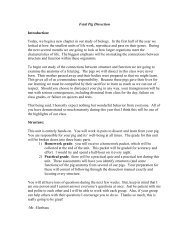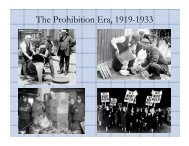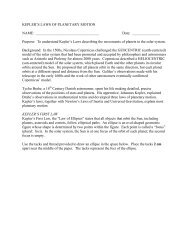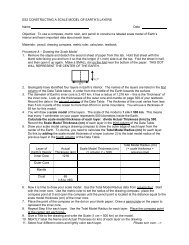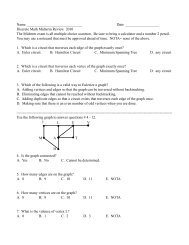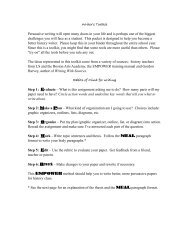Nifty Fifties Essay - Lincoln-Sudbury Regional High School
Nifty Fifties Essay - Lincoln-Sudbury Regional High School
Nifty Fifties Essay - Lincoln-Sudbury Regional High School
You also want an ePaper? Increase the reach of your titles
YUMPU automatically turns print PDFs into web optimized ePapers that Google loves.
DOCUMENT FIVE: Brown v. Board of Education DecisionSegregation of white and colored children in public schools has a detrimental effect upon the colored children. Theimpact is greater when it has the sanction of the law; for the policy of separating the races is usually interpreted asdenoting the inferiority of the Negro group. A sense of inferiority affects the motivation of a child to learn. Segregationwith the sanction of law, therefore, has a tendency to retard the educational and mental development of Negro childrenand to deprive them of some of the benefits they would receive in a racially integrated school system. Whatever mayhave been the extent of psychological knowledge at the time of Plessy v. Ferguson, this finding is amply supported bymodern authority. Any language in Plessy v. Ferguson contrary to this finding is rejected.Citation: Brown v. Board of Education, 347 U.S. 483 (1954).DOCUMENT SIX: Folk Song: Little Boxes by Malvina ReynoldsLittle Boxes on the hillside, little boxes made of ticky tacky,Little Boxes on the hillside, little boxes all the same,There's a green one and a pink one, and a blue one and a yellow one,And they're all made out of ticky tacky and they all look just the same.And the people in the houses all went to the university,Where they were put into boxes and they all came out the same,And there's doctors and lawyers, and business executives,And they're all made out of ticky tacky and they all look just the same.And they all play on the golf course and drink their martini dry,And they all have pretty children and the children go to schoolAnd the children go to summer camp and then to the university,Where they are all put in boxes and they all come out the same.Citation: "Little Boxes," folk song, 1962. Words and music by Malvina Reynolds, 1962. Schroder Music Co.DOCUMENT SEVEN: Quotation from a Suburban Housewife"We were all in the same boat . . . We shared everything; we shared tools and cars, minded each other's kids, passedplay-pens and high-chairs from house to house—everything. It was—at least to us—a Paradise."Citation: Mrs. Klerk, quoted in Barbara M. Kelly, Expanding the American Dream: Building and Rebuilding Levittown, (Albany: StateUniversity of New York, 1993).DOCUMENT EIGHT:Excerpt from The Affluent Society, by John Kenneth GalbraithPoverty—grim, degrading, and ineluctable—is not remarkable in India. For few, the fate is otherwise. But in the UnitedStates, the survival of poverty is remarkable. We ignore it because we share with all societies at all times the capacity fornot seeing what we do not wish to see. Anciently this has enabled the nobleman to enjoy his dinner while remainingoblivious to the beggars around his door. In our own day, it enables us to travel in comfort by Harlem and into the lushprecincts of midtown Manhattan. But while our failure to notice can be explained, it cannot be excused. "Poverty," Pittexclaimed, "is no disgrace but it is damned annoying." In the contemporary United States, it is not annoying but it is adisgrace.Citation: John Kenneth Galbraith, The Affluent Society, 4th ed. (Boston: Houghton Mifflin, 1984), 254.6




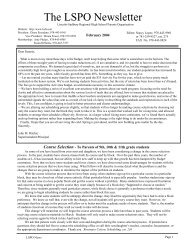
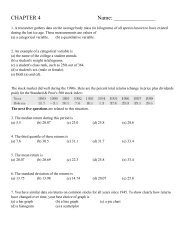


![';1asAu ro; las I sgeo8 leuo!]eslanuol aql utelqo o1 palenttouJ ue I ...](https://img.yumpu.com/49072782/1/190x221/1asau-ro-las-i-sgeo8-leuoeslanuol-aql-utelqo-o1-palenttouj-ue-i-.jpg?quality=85)

